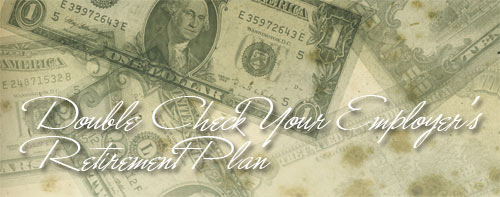When you work for an employer, you might have access to benefits, including a retirement plan. Your company's retirement plan — usually a 401(k) — can be a way to help you build your nest egg through the power of investing and compound interest. However, you want to double check to make sure that your employer's retirement plan is what you want to be devoting your resources to.
In some cases, you might not want to rely too heavily on your employer's retirement plan to build your wealth. Here are some things to consider:

Quick Navigation
Matching Contributions
One of the biggest advantages of many employer sponsored retirement plans is the matching contributions that you can receive. Your employer will match your contribution up to a certain amount. This is free money that goes into your retirement account.
Before you sign up, make sure that you check into the vesting rules. In some cases, the employer portion of your contribution might not be available to you for a certain number of years. If you're planning on changing jobs in the next couple of years, you might lose the employer match portion because of vesting rules.
Employer Stock
Another consideration is how much of the plan's investments are in company stock. Some retirement plans require that a large portion of your contributions buy employer stock. If the company goes down, this means that you lose out in your 401(k), as well as in terms of your job. An employer's plan that is heavily weighted in its own stock might not be the choice for a large portion of your money.
Investment Options and Fees
What investment options are available with your employer's plan. Some plans only provide options to invest in managed funds with high fees. Other plans may not provide you with enough options that you are interested in. You want to be able to make decisions that work best for you, and if your company plan is light on low-fee options, you could lose a lot of money on unnecessary costs.
What to Do if You Aren't Happy with Your Retirement Plan Options
You can always talk to your human resources representative about your options. You might be able to persuade your employer to re-vamp the plan offerings. If this isn't possible, consider your other options. If your employer offers a matching contribution, it might be worth it to contribute the maximum you can to get the match, and then use an IRA for the rest. You can open an IRA even if you have a 401(k) at your job. This can make it possible for you to invest in low-fee options with the bulk of your contributions.
In some cases, employees will fully fund an IRA, and then invest whatever's left in terms of budgeted contributions with an employer's plan. It's important to weigh your options. A tax-advantaged account has benefits that a “regular” investment account doesn't have when it comes to the long-term. Consider what is likely to work best for you, and how you can make the best of the situation if you aren't happy with your employer's 401(k) options.
This is the year to turn my finances around. Adding a retirement plan that makes sense now and in the future is on the table. We just need to start building it. I have great a great feeling about this year. I hope you do too.
I think of all the considerations that you mentioned, reviewing the investment fund performance and fees is the most important. High cost funds can really lower your investment potential. 401ks are generally a great investment option, but that doesn’t make all 401ks the best investment option by default. You still need to read the fine print.
Reviewing fees is extremely important. Sadly though, many 401(k) plans bury fees that the participants never see unless they go through the legwork of obtaining plan documents. (I’m talking about fees other than the individual fund expenses.) There was a law passed (can’t think of the name of it) that is requiring 401(k) plans to list all of the fees they charge. I think people are going to be blown away by how much these plans are charging.